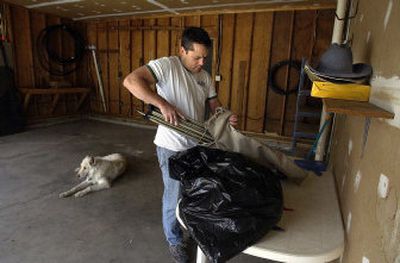Same goal, more obstacles

A firefighter taking a year leave of absence from flaming buildings would be safer for it, one would think, but that’s not Darrin Coldiron’s case.
Coldiron, a Spokane Valley firefighter, clocks out for the last time Thursday. Shortly thereafter, he’ll make the 30-hour trip to the small Sri Lankan village of Komari, where rebels and government soldiers are exchanging gunfire.
Coldiron wants no part in the fighting. He and a handful of volunteers have been working for more than a year to rebuild the fishing town of 3,000 people, which was 95 percent destroyed by the tsunami of Dec. 26, 2004. They’ve formed a small nongovernmental organization called CFDR Komari. The initials stand for Community Focused Disaster Response.
Coldiron vowed earlier this year to spend the next 12 months helping the villagers get back on their feet and he’s not turning back, though he isn’t running full steam ahead, either.
“The situation is pretty severe right now, but we’re not changing our plans,” Coldiron said. “What we are doing is evaluating whether it’s safe enough to bring in volunteers.”
Sri Lanka hasn’t been very safe for its own people, let alone tsunami aid workers. Two weeks ago, the New York Times pegged the April death toll for Sri Lankan infighting at 200. More recently, there have been market bombings and homes and schools burned in retaliation for attacks by the guerrilla forces of the ethnic Tamils. The Tamils, according to the London Financial Times, control about 10 percent of the country. They are mostly Hindu and Christian and at odds with the Sinhalese Buddhists who run the government. The two parties negotiated a truce in 2002, but that truce has been slowly eroding since last November.
Komari isn’t at the epicenter of the fighting, Coldiron said. The community is on the edge of the territory claimed by the Tamils and has previously avoided conflict, but not this time.
CFDR volunteer Dawn Hayden, who is in Komari, reports that unidentified gunmen attacked members of the government’s special task force, or STF, inside the village earlier this month.
“Since then,” Hayden wrote in a May 18 e-mail, “there have been daily roundups by the STF in people’s homes checking for their national identity cards. Yesterday the STF searched all the schoolchildren’s bags and checked their water bottles. Checkpoints that had been routine and civil since the ceasefire in 2002 are now fear laced.”
“Soldiers hold their weapons with their fingers on their triggers as they search bags and vehicles and verify individual identities,” wrote Hayden.
But the people of Komari want peace. They’ve formed representative committees and approached the fighting parties to ask that Komari stay out of the crossfire.
David Kanapathipillai, Komari’s school principal, said it was crucial the fighting stop so the town can rebuild.
“There is much work to be done,” Kanapathipillai said. “Look at the good work of CFDR. We need this village to be safe so they can keep on their helping.”
It was Kanapathipillai who traveled to Washington and Montana in 2005 to talk with students and CFDR supporters about the tsunami disaster, which pulled his wife and father-in-law out to sea.
That Komari villagers joined together to approach the warring parties is a good sign, Coldiron said. There was no leadership in January 2005 when Coldiron and another volunteer firefighter, Nick Muzik, decided they’d be the first people to return to flattened Komari. They rented one of the few buildings left standing, and then started cleaning up properties and forming construction crews of local residents to rebuild the town.
Muzik, Coldiron and Nuwan Waidyanatha, a Sri Lankan with whom Coldiron played rugby at the University of Montana, started CFDR.